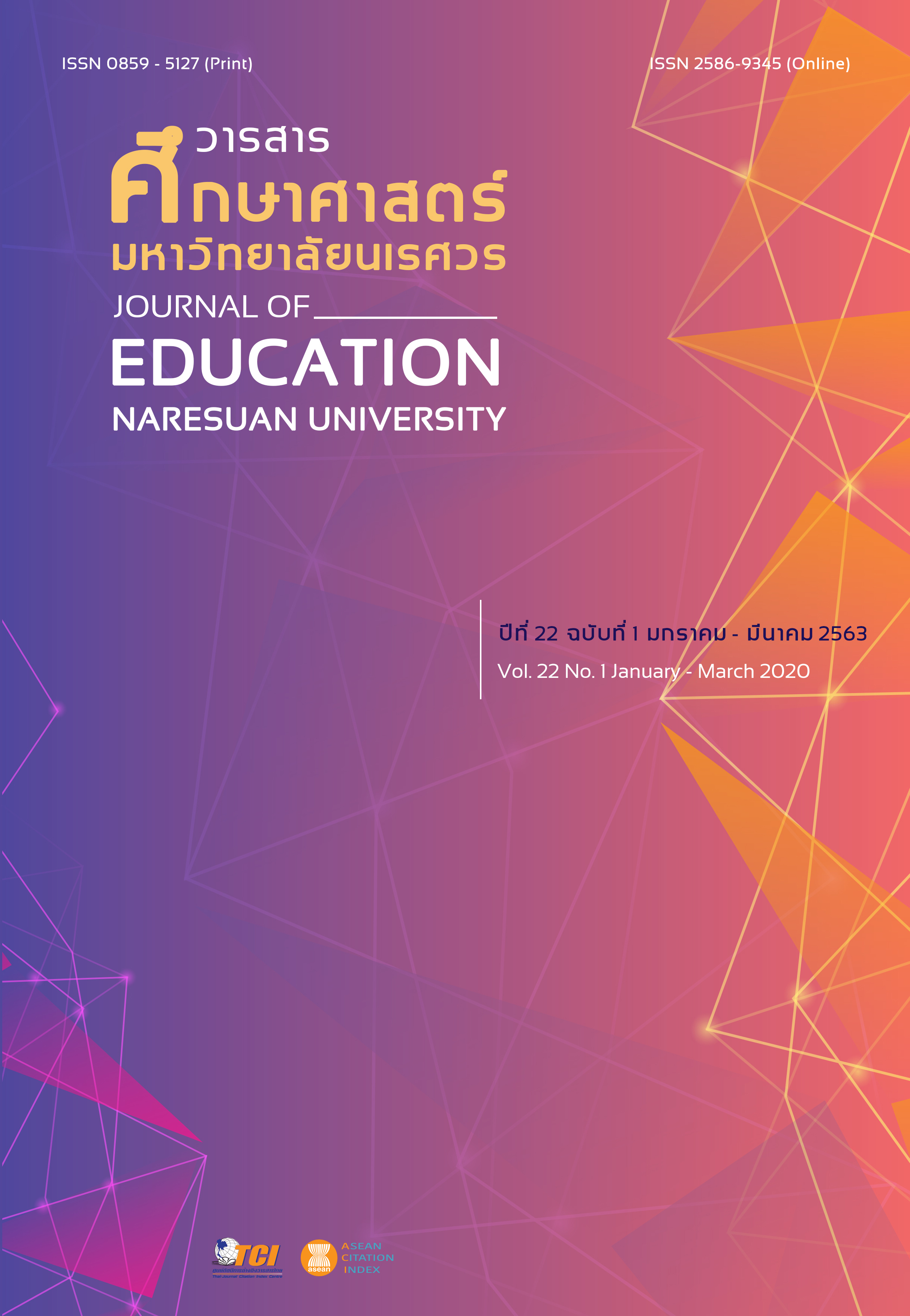A STUDY OF RELATIONSHIP BETWEEN PRE-SERVICE TEACHERS’ PRIOR EXPERIENCE ON SCIENCE LEARNING AND THEIR SELF-EFFICACY BELIEF ON INQUIRY-BASED LEARNING
Main Article Content
Abstract
This study aims to investigate the level of student teachers’ prior experience on science learning (PES) and self-efficacy belief on inquiry-based learning (SEI), as well as to examine the relationship between these two variables. The study involved 72 fourth year students majoring in science teaching. Data were collected via questionnaire which was validated by three experts. The reliability of the questionnaire on the PES part and the SEI part were .90 and .89 respectively. Findings indicate that majority of the student teachers had a moderate level both PES and SEI part. However, most of the student teachers had a high expectation on their teaching outcomes. It signifies that the future teachers anticipated their teaching could result in high level of students’ learning achievement and they are likely to teach science through inquiry learning. Additionally, this study reveals a positive relationship between PES and SEI (r = .27, p < .05).
Article Details
The owner of the article does not copy or violate any of its copyright. If any copyright infringement occurs or prosecution, in any case, the Editorial Board is not involved in all the rights to the owner of the article to be performed.
References
Adams, J. D., & Gupta P. (2017). Informal science institutions and learning to teach: An examination of identity, agency, and affordances. Journal of Research in Science Teaching, 54(1), 121–138.
Banchong, W. (2008). Casual factors of researcher identity and self-efficacy on behavior of student teachers during educational reform. Journal of Behavioral Science, 14(1), 117-134.
Bandura, A. (1977). Social learning theory. Englewood Cliffs: Prentice Hall.
Bandura, A. (1997). Self-efficacy: The exercise of control. New York: Freeman.
Bandura, A. (1998). Self-efficacy. In H. Friedman (Ed.), Encyclopedia of mental health. San Diego: New York: Academic Press.
Barty, L. (2004). Embracing ambiguity in the artifacts of the past: Teacher identity and pedagogy. Canadian Social Student, 38(3), 1-22.
Chi, H. J. (2009). Development and examination of a model of science teacher identity (STI) (Doctoral dissertation). Columbus, OH: Ohio State University.
Enochs, L. G., & Riggs, I. M. (1990). Towards the development of an elementary teacher’s science teaching efficacy belief instrument. Science Education, 74, 625-637.
Faikhamta, C., & Clarke, A. (2015). Thai pre-service science teachers engaging action research during their fifth year internship. Asia Pacific Journal of Education, 35(2), 259-273.
Faikhamta, C., Ketsing, J., Tanak, A., & Chamrat, S. (2018). Science teacher education in Thailand: A challenging journey. Asia-Pacific Science Education, 4(3). https://doi.org/10.1186/s41029-018-0021-8.
Intawong, B., Prachanban, P., & Kanjanawasee, S. (2017). The development of an evaluation model for the characteristics of the student teachers quality: Applying the utilization-focused evaluation. Journal of Education Naresuan University, 19(4), 144-156. [in Thai]
Jantarakantee, E., & Roadrangka, V. (2010). The cooperating teachers’ and the university supervisors’ understanding of classroom research, principles and the supervision of classroom research for pre-service science teachers. Kasetsart Journal of Social Sciences, 31, 319– 332.
Ji, H., & Penelope, V. (2016). Science teachers’ perception and implementation of inquiry-based reform initiatives in relation to their beliefs and professional identity. International Journal of Research Studies in Education, 5(1), 3-17.
John, P. D. (2002). The teacher educator’s experience: Case studies of practical professional knowledge. Teaching and Teacher Education, 18(3), 323–341.
Junprasert, T., & Thammaruksasit, N. (2015). Professional socialization: A developmental process of professionalism in the WorkLife. Journal of Behavioral Science, 21(1), 193-206.
Ketsing, J. (2017). Preservice science teachers’ challenges in doing classroom action research and learning activities to cope with the challenges. Kasetsart Journal of Social Sciences, 38, 457-469.
Ketsing, J., & Roadrangka, V. (2010). A case study of science teachers’ understanding and practice of inquiry-based instruction. Kasetsart Journal of Social Sciences, 31, 1–16.
Levin, B., & He, Y. (2008). Investigating the content and sources of teacher candidates’ personal practical theories (PPTs). Journal of Teacher Education, 59(1), 55–68.
Luehmann, A. L. (2007). Identity development as a lens to science teacher preparation. Science Education, 91, 822-839.
Menon, D., & Sadler, T. D. (2016). Preservice elementary teachers’ science self-efficacy beliefs and science content knowledge. Journal of Science Teacher Education, 27(6), 649-673.
Ngernsri, D., & Lawthong, N. (2009). Use and effect model of self-efficacy of secondary school teachers under Bangkok educational service area offices. An Online Journal of Education, 4(1), 1231-1244. [in Thai]
Office of the National Education council. (2016). Research report on future trends in education and learning in Thailand, 2030. Bangkok: 21th Century Publication. [in Thai]
Pandee, M., Jantarach, V., Chalong, P., Chukaeo, O., & Sitthitunyagum, B., (2017). Exploring Thai EFL pre-service teachers’ level of self –efficacy and its sources. Veridian E-Journal, Silpakorn University: International Humanities, Social Sciences and arts, 10(4), 190-208.
Redmon, R. J. (2007). Impact of teacher preparation upon teacher self-efficacy. The Annual Meeting of the American Association for Teaching and Curriculum. Cleveland, Ohio.
Roehrig, G. H., & Luft, J. A. (2006). Does one size fit all? The induction experience of beginning science teachers from different teacher-preparation programs. Journal of Research in Science Teaching, 43(9), 963-985.
The Teachers’ Council of Thailand. (2013). Regulation of the Teachers Council of Thailand on Professional Standards and Ethics. Retrieved December 25, 2017, from https://teachercodes.iiep.unesco.org/teachercodes/codes/Asia/Thailand.pdf
Thomson, M. M., DiFrancesca, D., Carrier, S., & Lee, C. (2017). Teaching efficacy: Exploring relationships between mathematics and science self-efficacy beliefs, PCK and domain knowledge among preservice teachers from the United States, Teacher Development, 21(1), 1-20.
Wall, C. R. G. (2016). From student to teacher: changes in preservice teacher educational beliefs throughout the learning-to-teach journey, Teacher Development, 20(3), 364-379.


